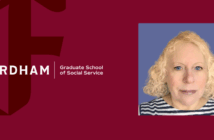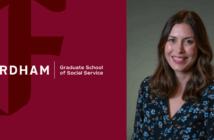Addressing disability issues crosses many disciplines and professions but, unfortunately, the complexity of the issue in terms of education, employment, health care, and, most importantly, social justice and human rights, seldom rises to the top of the priority concerns in academia or the community, even among social work services. Yet, almost 57 million people in the United States – representing 19 percent of the population — had a disability, with more than half reporting that the disability was severe (U.S. Census, 2012). Disability is a life-span issue encompassing learning and development disabilities, mobility and trauma related disabilities and disabilities accompanying the many age-related diseases experienced by middle-aged and older adults.
My own research has focused on older adults experiencing disability in later life. Having worked at Lighthouse International for 20 years, much of my research has addressed the issues of vision impairment among older adults as a result of age-related eye diseases which seldom leave the older adult totally blind but with some degree of visual loss. Vision impairment in later life can be considered a prototypical disability associated with aging in that it is common (affecting approximately 20% of all persons age 65 years and older), with a gradual onset, a chronic course, yet not life threatening. More than many other age-related conditions, it can threaten the older adult’s self-image, identity, and has profound consequences for physical, social, and emotional functioning. Over the past many years, my colleagues and I (Drs. Joann Reinhardt and Verena Cimarolli of The New Jewish Home in New York, and Dr. Kathrin Boerner at University of Massachusetts, Boston), with funding from the National Institutes of Health, have examined the longitudinal relationships between visual disability, rehabilitation and depression; the use of coping strategies to address the challenges of vision loss in later life; and driving transitions among older drivers with disabilities and how personal, social, and environmental factors can mediate the consequences of driving cessation on mental health. Across each of these studies we have examined the experience of disability within a family context, either in terms of the impact of the elder’s disability on their social networks, or the role of social support in buffering the impact of disability on physical and mental health.
Our most current work looks specifically at Long-Distance Caregiving; that is, family and friends who are primary caregivers to older adults with a range of disabilities but who live a significant distance (two hours travel) from the elder. While there is a rich knowledge base on family caregiving to frail elders, as well as on interventions designed to support caregivers, most research to date has focused on the primary, geographically proximate caregiver. Yet, it is estimated that as many as 11% of family caregivers in the U.S, and 9% of those providing care to persons with dementia, live more than two hours away from the care receiver. We have little in-depth knowledge about this growing phenomenon, especially as it applies to caregivers across diverse SES and racial/ethnic groups. With funding from the National Institute on Aging, we are currently collecting data from 350 long-distance caregivers in order to provide an in-depth examination of the unique stressors they experience; the factors that promote or hinder distance caregiving and influence caregiver well-being; and the communication and coordination challenges between formal care providers and long-distance caregivers (LCDs). This knowledge base can then be used to inform policy, design and test interventions adapted to the needs of the LCD, maximize innovation, and foster an evidence-based response to the needs of this growing group of caregivers to frail elders. We are more than happy to speak to anyone interested about the details of this work.
Furthermore, Fordham University has recently begun a major initiative in establishing the Faculty Working Group on Disability, a university-wide initiative, crossing school and disciplinary boundaries and chaired by Dr. Sophie Mitra. This Working Group has established the Fordham Disability Scholarship Cluster which coordinates and showcases scholarship on disability at Fordham University, including the establishment of a regular Seminar Series on Disability with presentations from both Fordham faculty and other invited speakers. For highlights of faculty research and courses offered at Fordham which are related to disability issues, please go the Fordham Disability Scholarship Cluster website.
We welcome all faculty and students interested in disability issues to contact the Faculty Working Group on Disability and become involved in current initiatives.
Amy Horowitz, PhD Professor Fordham University Graduate School of Social Service 113 West 60th Street New York, NY 10023 ahorowitz2@fordham.edu



